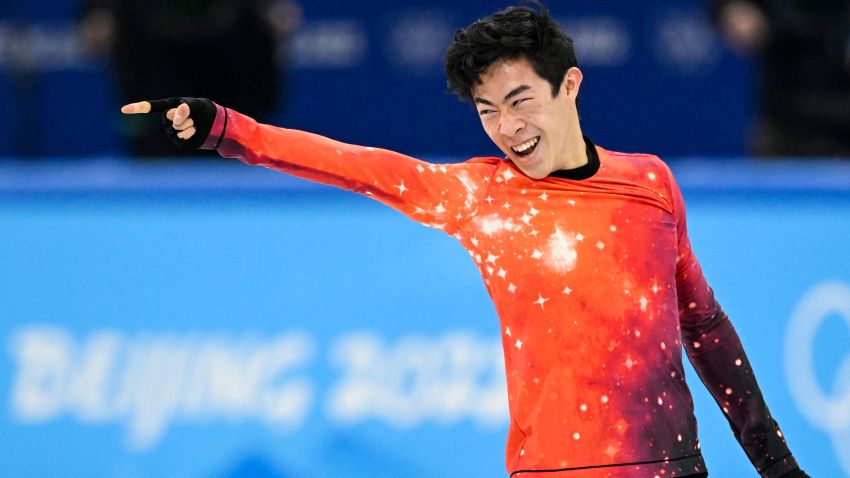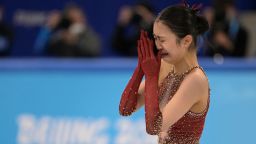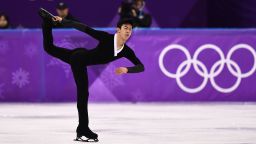Editor’s Note: Amy Bass (@bassab1) is professor of sport studies at Manhattanville College and the author of “One Goal: A Coach, a Team, and the Game That Brought a Divided Town Together” and “Not the Triumph but the Struggle: The 1968 Olympics and the Making of the Black Athlete,” among other titles. The views expressed here are solely hers. Read more opinion on CNN.
Redemption is a key element of why we watch sports. Without the enticement of redemption – that moment when the also-ran recovers enough from defeat to look to the winner to ask “play again?” – there would be no reason for the fan to keep watching (which is why we keep watching, although at times it is through clenched teeth and eyes pressed shut) or the athlete to keep trying.
This dimension of sport is something American figure skater Nathan Chen, who secured his long-awaited gold medal in men’s singles on Thursday morning, surely knows all too well.

Chen’s redemption is also a reminder of what sport means to the rest of us as well. Whether competition ends in a blowout or a squeaker, on a playground or on Olympic ice, its beauty is that it is never a zero-sum game. There can always be a rematch, that “let’s play again tomorrow” moment that enables the defeated to transcend their loss and find, if not gold, redemption.
The Olympics, of course, derive a significant part of their noted drama from making everyone wait four years – and sometimes longer – for this kind of restoration.
American snowboarder Lindsey Jacobellis had to wait 16 years to find her way back to the podium, having to settle for silver in Torino in 2006 when she infamously threw a little ill-advised flair just a few yards from the finish line, a premature celebration that crashed her gold medal dreams.
In Beijing, now 36, she stayed low as she crossed the line, a slow-breaking smile and hand to the heart the only signs that she knew she had just brought the United States its first gold medal of this Olympics and become the oldest American woman to win a medal at a Winter Games.
For most of us mere mortals who cannot, as Chen did Thursday, land five quadruple jumps (or any kind of jump, for that matter), sport feels easy because that’s how it looks – think how often we use words like “effortless” to describe something as crazy as a triple axel – when the stars do what they are supposed to do.
But the stark contrast among the Team USA’s gold rush in the last few days – Chloe Kim’s confident yet emotional defense of her Olympic title on the halfpipe, Jacobellis’s long-awaited reclamation of Olympic glory, and Chen finally making things right after they had gone so very wrong – show just how extraordinary a feat it is to win.
Chen, whose record-setting short program in Beijing was a far cry from the disappointment that went down in PyeongChang four years ago, has spent the last four years building the legendary record that brought him back to Olympics. He won national championships each year (bringing his total since 2017 to six) and three straight world championship titles, with only one loss – to US teammate Vincent Zhou, who announced his own withdrawal from individual competition in Beijing on Instagram after a positive Covid test, an utter gut punch to his fans.
Despite this sheer dominance, Chen could not liberate himself from the shadow of his fifth-place finish in 2018, a moment that demonstrated how there is never a sure thing in sport, and try as anyone might, no amount of cheering, finger-crossing or lucky shirts can make things go the way we want, or the way we think it should go.
The years of Chen’s skating dominance have also been a time when athletes are taking more control over what redemption means – or whether it’s even necessary. In Tokyo last summer, Simone Biles called the obstacle that stood between her and the prediction of an unprecedented haul of gold “the twisties” – a word gymnasts use for the inability to maintain safe awareness of where their bodies are in space as they perform gravity-defying skills.
For Biles, this meant being a gymnastics GOAT on the bench instead of up in the air – but she took her well-being into her own hands and offered no apologies.
In Beijing, we don’t know yet what Mikaela Shiffrin will call her obstacles, but she had time to think about it, sitting on the snow by herself for a soul-crushing 20 some minutes after going out of the slalom on the fifth gate, her second DNF in a matter of days.
It was that kind of Olympic moment, the one Shiffrin is having, that defined Chen for four years. Not his magnificent comeback in 2018 in the free skate, which catapulted him from near the bottom to fifth place, nor the titles he has racked up since have been able to erase that disastrous short program, inextricable from how we saw him and, perhaps, how he saw himself.
Until now.
Once on the ground in Beijing, Chen left as little to chance as humanly possible, from his training to his Covid-19 precautions, rarely seen without his N-95 mask, including on the practice ice, and avoiding the team box last week during the team competition after his part was done.
And with the gold medal finally around his neck, he erased his PyeongChang short program fiasco not once but twice in Beijing, with the hardest quad on the ice – the quad Lutz – in full force.
Chen entered the free skate with a 5.85-point lead over Japan’s Yuma Kagiyama, who left even more room with a stumble on a quadruple loop. But with Chen’s opening quadruple flip triple toe loop combination at Beijing’s Capital Indoor Stadium, a rink located in the city where his mother grew up and his parents met before emigrating to the United States, it was clear that he didn’t need anyone to stumble.
For the first time in four years, the gold medal didn’t just feel like it was within reach. It felt, as he moved across the ice in his flaming red, orange and purple shirt, Elton John’s lyrics – “I think it’s going to be a long, long time” – propelling his jumping combinations and producing a widespread grin on his face as he powered through his fiery step sequences – like a foregone conclusion, logging numbers that didn’t just mean he won.
He crushed it, creating a gap in the score between the gold and silver medals that made it look like two different events had taken place.
Yet as Chen returns home with a gold medal, the image of Shiffrin sitting on the mountain, skis off, her head cradled by her hands as she contemplated what went wrong and surely doubted what lies ahead, remains.
With a possible three events left to ski, she reminds us that redemption still looms large for some, including the best of the very best. What comes next will be up to her alone, but it won’t diminish the stature she’s already earned as a champion – and it’s clear that in years to come, athletes will continue to rewrite the narrative of redemption on their own terms.






